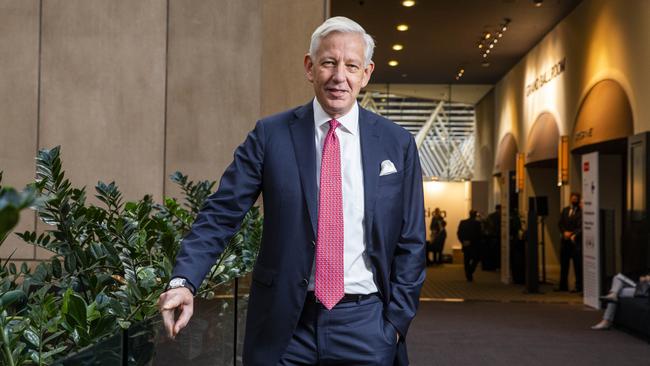Activist hedge fund Palliser aims to swing Rio Tinto vote with BHP comparison
UK hedge fund Palliser Capital is ramping up its campaign for Rio Tinto to abandon its London listing, challenging shareholders to consider rival BHP’s performance since it ditched dual listing.

UK hedge fund Palliser Capital is ramping up its campaign for Rio Tinto to abandon its London listing, challenging the mining giant’s shareholders at Thursday’s annual general meeting to consider arch rival BHP’s performance in the three years since it ditched a dual-listed structure.
Rio and Palliser are engaged in a war of words over costs and the implications for franking credits amid the hedge fund’s campaign for transparent review of Rio’s dual-listed structure, with ASX shareholders set to vote at the mining giant’s AGM in Perth on Thursday.
Palliser chief investment officer James Smith said on Sunday that Rio shareholders should look at how BHP had performed since abandoning its dual-listing structure in early 2022. BHP left the London Stock Exchange behind for a primary listing on the ASX.
“The Australian vote will be a reflection to some degree of how well BHP has done since its unification,” Mr Smith said.
“If Australian investors believe that has been successful for BHP and its investors, then they should echo the recommendations of (proxy advisers) ISS and Glass Lewis and vote for an independent review.”
London shareholders voted on the Palliser motion, which would force Rio to launch a transparent strategic review, at the start of April with the results kept secret until after the ASX investor vote.
Palliser doesn’t think it has the numbers for the motion to carry, but is hoping for at least 20 per cent support.
Under UK corporate governance standards, that would compel the Rio board to consult shareholders and provide an update on the feedback and any action taken within six months.

The Palliser motion needed a 75 per cent majority of PLC (London) and Ltd (ASX) shareholders to pass, and that would have required a big vote in favour at the London meeting given that 77 per cent of shareholders own the PLC stock.
Palliser hopes to get the ball rolling on change through the British governance standards, and that the process will be shorter than the four years Elliott Management took to reform its structure.
Mr Smith, who worked at Elliott Management when it pushed for change at BHP, is expected to address the Perth meeting either in person or by via video link.
Rio is highlighting the value of the franking credits on its balance sheet to Australian self-funded retirees ahead of the meeting.
There are also concerns within the Rio board that a transparent review will expose confidential tax arrangements across its global operations.
The Rio board’s view is that unification would lead to tax costs in “mid-single digit” billions of dollars and not be in the best interest of shareholders.
Palliser disputes the tax cost estimate and argues the dual listing has created a value drag of about $US50bn ($78.2bn) from an inability to use equity in acquisitions over the past 30 years, and that unification could release up to $US25bn in value.
The ASX shares trade at a higher premium to those on the London exchange, which is partly attributed to franking credits that are unique to Australia’s dividend imputation system.
The Rio board has warned the company’s franking credit balance – about $US9bn – would run down much faster and couldn’t be distributed over the long term to the benefit of the company and Australian shareholders under unification.
In pushing the Palliser motion with investors, Mr Smith said Rio would become more than four times larger as a component of the ASX 200 index through listing unification.
“Australian institutional and retail shareholders are significantly under-represented in Rio Tinto’s shareholder base – despite the fact that the majority of the group’s profits and cashflow are generated in Australia,” he said.
“In 2024, BHP chief executive Mike Henry publicly shared that by unifying, BHP removed a 10 to 20 per cent discount on the portion of the company that was listed in London, and the change made it more practical for BHP to pursue scrip-based acquisitions,” Mr Smith said.
“While there are certainly fluctuations in the iron and lithium markets, the fact is that since announcing and completing its own unification, BHP’s total shareholder return has consistently outperformed Rio Tinto’s, irrespective of the markets.”

One of the big unknowns from the London vote is whether China’s Chinalco voted for or against the Palliser motion, or abstained.
Chinalco’s options on Rio have been limited since 2008 when then treasurer Wayne Swan approved its acquisition of up to 14.99 per cent of the PLC shares, equating to about 11 per cent across the group.
In securing the approval, Chinalco gave an undertaking that it would not raise its shareholding without receiving fresh approval from the Australian government.
Rio and a Chinalco-led consortium are partners, along with others, in the Simandou iron ore project in Guinea in West Africa that is on track to begin production later this year.
While ISS and Glass Lewis have recommended a vote in favour of the Palliser resolution, the Australian Council of Superannuation Investors, which provides an advisory service for the big pension funds, and Ownership Matters have both reiterated their opposition.
Rio declined to comment on Palliser’s BHP comparison on Sunday, but chairman Dominic Barton hit back when the issue was raised in the ISS advice to shareholders.
“At the time of BHP’s unification and associated petroleum division spin-off, only approximately 5 per cent of its earnings were contributed by its PLC company,” Mr Barton said in a letter to shareholders.
“In contrast, almost all of Rio Tinto’s non-Australian assets, including major growth projects, are held under its PLC company. Furthermore, Rio Tinto has a far greater proportion of the shares held through the PLC company (77 per cent at Rio Tinto compared to 42 per cent at BHP prior to unification).”
Iron ore operations in Western Australia contributed almost 70 per cent of Rio’s underlying earnings before interest, taxes, depreciation, and amortisation of $US23.3bn in 2024, but the company is trying to reduce its reliance on the steelmaking ingredient with investments in copper and lithium.
More Coverage
Originally published as Activist hedge fund Palliser aims to swing Rio Tinto vote with BHP comparison





